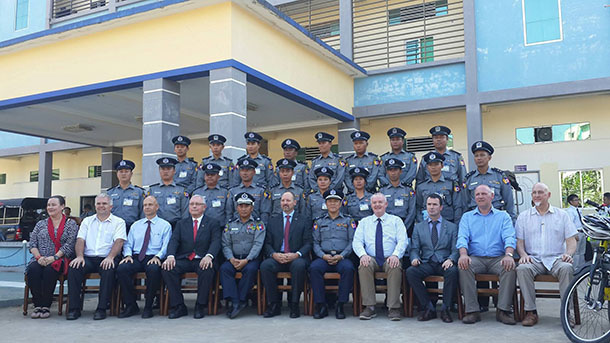The police’s handling of protesting students this week at Letpadan in Pegu Division has appalled much of the world, yet again putting Burma in international headlines for all the wrong reasons. Photos of baton-wielding police savagely beating up helpless students and their supporters immediately spread via social media, drawing heavy condemnation from domestic and international audiences alike.
Perhaps more deplorable than the brutal use of force against the demonstrators is that this same police force has been receiving training from the European Union since September 2013, a program that is described as seeking to professionalize this checkered institution. The European bloc has poured €10 million (US$11 million) into training the police, one component of the program being lessons in crowd management and riot policing.
Brussels decided to support this program in response to requests from the government and opposition leader Aung San Suu Kyi, who said the Myanmar Police Force (MPF) needed reform, and specifically training in crowd control, in line with internationally accepted norms. The EU Ambassador to Burma Roland Kobia said that with this training program they wanted to help “improve the human rights performance of the Myanmar Police Force and initiate the development of a police service that respects and protects democratic rights of citizens.”
On Tuesday, Burmese people saw anything but the realization of these goals. It was perhaps one of the most egregious violations of citizens’ democratic rights in years, but it wasn’t the first instance of such a nature since the EU program began. Recent labor strikes and a student protest on March 5 in Rangoon were also forcibly dispersed by police, and in both these cases officers were assisted by plainclothes men wearing red armbands inscribed with the word “duty.”
The European Union was quick to make clear that its training did not extend to non-police forces.
But it defended a continuation of the MPF training, insisting that improvements had been witnesses in some instances but that “change does not happen overnight.” Their defense of the training program shows the naïveté of a bloc of nations that has not properly considered the political realities of a country that has, since 2011, sold a reform program of dubious pedigree.
A comparison of authorities’ handling of a series of confrontations over the last few years is instructive.
Since the EU training began, we’ve seen excessive use of force at the controversial Letpadaung copper mine, in the quashing of recent labor strikes and crackdowns on the student protests in favor of education reform. All of these were obvious cases of Burmese people exercising what they mistakenly thought was their freedom of expression and assembly. For it, they were beaten and dispersed, or in the case of one woman in Letpadaung, shot dead.
In contrast, you have police’s handling of communal unrest in Arakan State and Mandalay Division’s Meikhtila, where police were accused of standing by while mobs killed helpless victims and set alight their homes in broad daylight. Were it not for their inaction, many lives likely would have been saved.
In noting these differences, a questioning of the sincerity of the government’s purported desire to reform the institution is inevitable.
Photos and video clips from Letpadan show that if anyone can be accused of rioting, it was the police, who indiscriminately beat and kicked the students, as well as gratuitously smashing the protesters’ vehicles. Not even defenseless protestors who had fallen to the ground were spared the baton.
The painful truth is that the Thein Sein government, composed mostly of members of the former junta, is not genuinely looking to reform the police. What’s needed is not police reform, but rather a shakeup of Burma’s policymakers. Once those at the helm of the nation are genuine, liberally minded reformers, the plainclothes thugs will disappear and the police will become a professional force.
Brussels runs the risk of looking opportunistically oblivious to the reality on the ground as it pursues its own national—or in this case—continent-wide interests in Burma.
But this is not something new. During the junta rule, the EU as a bloc or as individual member states held a double standard with regard to foreign policy toward Burma, imposing sanctions that were largely symbolic and did not have any real effect on the regime. Rather, EU member states came to Burma to do irresponsible business, in particular by investing in the country’s lucrative energy sector, among other pursuits. In a severely corrupt country, they neglected the fact that the money they split with the government only served to prop up a repressive regime.
Burma Campaign UK in 2008 reported that between 1995-96 and 1999-2000, total actual FDI in Burma’s oil and gas sector accounted for US$1.53 billion of a total actual FDI for all sectors of about US$2.77 billion. In 1999, the EU’s FDI accounted for 43 percent of all investment in Burma, and in 2000 the figure rose to 71.2 percent.
They eventually had to pay the price. French oil company Total, along with its American partner Unocal, were sued in their home countries by rights groups for their role in the Burmese military’s alleged human rights abuses against local villagers living along the Yadana gas pipeline. The offending companies had to pay millions of dollars in compensation to the victims.
EU leaders should review their Burma policy now. Yes, Burma is located in a geopolitically strategic position and is economically promising. The country’s recent political opening has given them a good reason to reverse their policy, but they should not forget that working with a government that still stinks of blood is a risky endeavor. While a return to sanctions may not be the answer, it’s time to put an end to the European Union’s unconditional embrace of its newfound Southeast Asian partner.
Wai Yan Hpone is a freelance writer and translator living in Rangoon. He has worked with several local media organizations and has so far published two translated books, as well as contributing to both local and international publications.
















